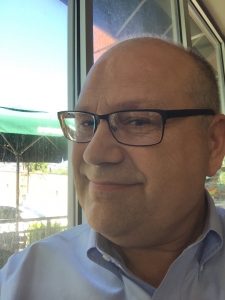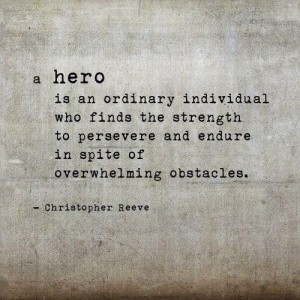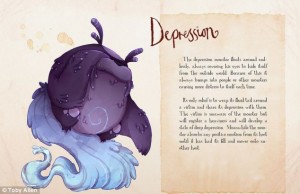Dr. Kathy McCoy writes, “Once the excitement of transitioning from the working world to retirement has become an altered version of real life — complete with dental appointments, tire rotations, bad habits and challenging friendships — there are some settling in realizations. It has been six years since Bob and I left our jobs in Los Angeles and headed for a new home in rural Arizona. Thinking back from the early days of our transition to the present, these are the realizations that have dawned as we’ve settled in”. Read her Blog
Settling Into Retirement: Six Years and Counting
How Faith Helps Depression
Blogger Therese Borchard writes, “A substantial amount of research points to the benefits of faith to mitigate symptoms of depression. In one study, for example, researchers at McLean Hospital in Belmont, Massachusetts, found that belief in God was associated with better treatment outcomes. Of all my sanity tools, my faith is what has kept me alive during severe depressive episodes. When I’m convinced that no one else could comprehend the intense suffering I’m experiencing, I cling to my belief in a God who created me for a reason, who knows my pain more intimately than any other human being, and who will see me through to the other side.” Read the Blog
North of 50 – Depression at Midlife
 When first diagnosed with depression fifteen years ago at the age of 40, I thought I would recuperate and, more or less, go back to my busy life as a lawyer and husband with a young family. It didn’t work out that way. I soon found out it was going to be a long haul. And I’m still truckin’.
When first diagnosed with depression fifteen years ago at the age of 40, I thought I would recuperate and, more or less, go back to my busy life as a lawyer and husband with a young family. It didn’t work out that way. I soon found out it was going to be a long haul. And I’m still truckin’.
What’s changed in my experience of depression over the past decade and a half? A lot.
I know much, much more about the illness; it’s contours, triggers, and wily ways. I know what will help when I’m in the thick of it, more often than not. I also accept there will be times when there’s little I can do to make a dent in depression’s cold armor.
My depression doesn’t last as long as it used to. Nor is it typically as deep. In the early days, it seemed like it went on forever. I couldn’t remember a time before it when I’d been happy. And couldn’t envision a future of being anything other than depressed. I felt I was barely living. Nothing gave me pleasure. Even eating good food, one of my favorite things. Everything tasted like ashes in my mouth. Death felt preferable, at times.
I didn’t feel much compassion for my depressed, younger self. I’d slap myself in the head and say, “What the hell’s wrong with you?” I had my own inner medieval-like inquisitor ready to burn my soul at the stake for some unknown sins depression’s twisted thinking had convinced me I’d committed.
The verdict: my depression was my fault.
I don’t believe that anymore. I now understand it’s a bunch of hooey cooked up by my depressed head. After all, depression’s a terrible liar. There’s a cruel irony to all of this. We need our minds to recover – but sometimes it’s this very organ that’s turned against us. Depression isn’t who we really are, but we can feel that way. As Parker Palmer once wrote about his experiences with this affliction, “I wasn’t walking in the darkness, I had become darkness.”
I have the upper hand on depression now. It isn’t the giant that once pummeled me. It isn’t as scary. Because I know know that depression will, yes, always be a part of my life, but it isn’t my life.
I am more than that.
And I have a good and full life that I’m determined to live.
Hope Counts: Rising Up from Depression
Depression corrodes our sense of hope.
Elizabeth Wurtzel, in her her best-selling book Prozac Nation, wrote:
“That’s the thing about depression: A human being can survive almost anything, as long as she sees the end in sight. But depression is so insidious, and it compounds daily, that it’s impossible to ever see the end.”
We can’t imagine a future without depression. When we’re in the thick of its slimy grasp, our deadened and bleak state seems to go on and on and on. Days become more about survival and meeting our most basic obligations. And nothing more because we don’t have anything left to give. Our life becomes smaller. We’re treading water because there doesn’t seem an end in sight. We’re hit by the stun gun of depression.
Our most urgent hope is . . . the absence of depression.
But the absence of pain isn’t the presence of joy and all that makes life worth living. As Richard O’Connor, Ph.D. wrote in his book Undoing Depression:
“We confuse depression, sadness, and grief. However, the opposite of depression is not happiness, but vitality – the ability to experience the full range of emotions, including happiness, excitement, sadness, and grief. It’s not sadness or grief, it’s an illness.”
Amanda Knapp writes eloquently of her own experience:
“Depression, for me, is a miles deep crater that I believe I will never crawl out of. It’s disillusionment born of an unfulfilled longing for peace. It’s fear that hope will raise me up just to drop me even further down. It’s a cocoon of despair snuggled all around me doing its best to keep me from breaking when the inevitable fall comes. The irony in all of that is that it precludes me from living and dreaming and hoping and praying. But I hold on to it so strongly at times, as if my life depends on it. Because sometimes it feels like it does. But I sit here today, decently removed from the worst of those moments of despair, and I feel myself longing for hope.”
It’s critical that we deliberately nurture a hope better than just relief from our melancholy. We need to rise up out of the dust of our suffering. It’s not enough to exist. Our existence must matter. Living a life with meaning and purpose give us hope because it brings out the best in us – even with depression. And it’s a heroic journey.
I once wrote:
“In my view, folks with depression are not so much hapless, as they are heroes.What’s a hero after all? Someone who has a great challenge to confront? Check. Someone who must confront great adversity? Check. Someone who must get up every day and do battle with a formidable foe? Check. You see, for those of you who are struggling with depression right now, YOU ARE THAT PERSON. You’re the person who has to get up every day and cope with your depression. Others can help and support you, but it’s ultimately your walk to walk. And what a courageous walk it is; every single step of it.
Some of the best people that I’ve been privileged to know struggle with depression. While they don’t have shiny medals pinned on their lapels, there is an unmistakable strength in them – even if they don’t see it. I know it’s real because I see and feel it – just like when I am in a grove of giant and majestic pines during a walk in the forest.”
Dr. Anthony Scioli, author of Hope in the Age of Anxiety, writes that one of the things needed to build up our hope muscles is faith and a spiritual foundation (whether it be in God, nature or a higher power) to experience a more open attitude for developing faith in others as well as the universe.
Pope John Paul II once said,
“Do not abandon yourself to despair. We are the Easter people and hallelujah is our hope.”
So, nourish hope in your heart. Surround yourself with hopeful people, places and books.
And resolve to be hopeful.
Copyright, 2016 by Daniel T. Lukasik
The Regret Tape and The I’m Not Good Enough Mix – New Metaphors for Managing Anxiety and Depression
Blogger Clare Rose Foster writes about how metaphors help her identify and pin down her experiences by regaining perspective and use the language of shared experience to transfer and talk about some pretty intangible feelings. Read the Blog
Stop Living in Misery: You Deserve Better
From Above the Law, lawyer blogger Jenna Cho writes, “When you decided to go to law school, was it your aspiration to hate your job, hate your life, and live in misery? Of course not. Which begs the question: why are so many lawyers unhappy?” Read the Blog
From Breaststroke to Black Float: Dealing with Depression
One description of depression is that it is like the shapeless sagging of a rubber band that has been kept tight and taunt for too long. When feelings have been strong, stressed, unprocessed, or held captive over a period of time, we just stop feeling altogether. Persons and events no longer have the power to enliven us; we operate on a low level cruise control. Usually we keep functioning, but there is no positive or creative affect toward persons and things, and even less toward ourselves. We basically stop living our only life.
Many lawyers operate at this level, without even knowing that it is a kind of death. They have learned to take it as normative and unchangeable. Life is no longer enjoyable, and almost everything becomes another excuse to be upset, angry, aggressive, afraid or defensive. We all know many people who live at this level.
But I would also like to describe another common source of depression that is less often addressed: basic meaninglessness. Religion, philosophy, and culture are supposed to address that foundational need. But when religion or spirituality is largely in the head, mostly fear based, or merely moralistic, there is a huge vacuum in most people. The soul and the spirit are not fed at this level. I am afraid that it is the most common form of religion we now have in the West. Such people, often very smart, have no beginning, middle or end to their life story, unless they totally create it for themselves like some kind of Nietzschean “ubermensch”. This is inherently too big a task for one autonomous individual.
The “Is that all there is?” feeling overcomes most people in our culture somewhere in their mid to late forties, if they are at all typical. If you are riding a fast track of upward mobility, external success, and lots of control, you might be able to put it off for another decade. But it is hardly worth it, because then the patterns of avoidance, depression, splitting off, a basic non-intimacy with one’s deepest life, are so entrenched, that it is very hard to emotionally and intellectually change without a lot of grace – – and a lot of “grit your teeth” and try to bear it. We are largely unteachable at that point.
The grace, of course, will always be available, but often we have lost the recognition of it, the desire for it, the trust in it, and the ability to cooperate with it. We do not even know there is such a thing as grace (Acts 19:3), and it is indeed an “it” instead of a Presence, a power and a possibility. In fact, for an ego that has been in overdrive for forty years, the reception of grace will actually feel like a defeat, a humiliation, and a failure. If “I” have been doing it all along, any “we” experience of union and cooperation with Another will actually feel like a loss of control and a loss of self-importance. It will be like switching from an eager breast stroke to a back float, and still having to assume that I can still get there. That would be hard for any successful lawyer, and actually for any of us.
At this point, one’s overdeveloped faculties (rational mind, willpower and Yankee can do!) will have to give way to those that were left underdeveloped for the sake of what we call in men’s work “building our tower”. What do I mean by those “underdeveloped faculties”? Well, first of all, I should state that they are not just underdeveloped; they are actively rejected and denied as values at all. I think that is why religion tended to speak at this process as “conversion”. Because if it is authentic, it is a rather complete reversal (“convertere” in Latin) of previously held virtues and values. Probably also why authentic religious conversion is rather rare.
Okay, here goes. This is what changes. Things like admitted powerlessness begin to be admired over claims to power, unknowing over knowing, living without resolution over demanding closure, giving instead of taking, waiting instead of performing, listening instead of talking, letting go instead of collecting and hoarding, empathy with instead of domination over. The more traditional words that were used for these values were three: “Faith”, “hope”, and “charity”. What St. Paul says, “are the only things that last” (1 Corinthians 13:13). I am sure he is right. But, mind you, these are virtues that are only learned by many trials and many errors by the second half of life, at best. In the first half, they actually do not make sense. The trouble is that many lawyers in our secular world are not moving to the second half of life. They are becoming elderly but they are not elders.
At first you will not know where to turn, especially if you have a good mind, and you are used to explaining everything and determining your own direction. You have no practice at this different set of virtues. To be honest, only God can lead at this point. You had best give up, because all of your previous tools are useless and even counter- productive. This is exactly why Bill Wilson made the first necessary step of Alcoholics Anonymous the absolute admission of “powerlessness”. This is about as counter intuitive as you can get, or even seemingly non-rational (not irrational!).
So what am I proposing that you do? Really, not that much. I am first of all trusting in your ability to hear some of what I just tried to say. If you have persisted in reading this far, you are hearing me at some non-resistant level. We call this the “contemplative mind”, where you turn off the need to be right or wrong, agree or disagree, and just let something work on you at whatever level of truth there is. (Everything Belongs, Crossroad Press, 1999). The Eastern religions would call it non-dual thinking.
Secondly, I would encourage you not to try too hard, no self-assertion because that will only deepen your addiction to your own way of doing life. You will try to “convert” yourself by yourself, which is actually a oxymoron. If you try to be heroic and superior, you will only get more of the same, but now disguised with a religious or moral sugarcoating. Please trust me on this one, all great spirituality is about letting go. YOU cannot do it. IT is done unto you.” (Luke 1:38 and 28:43). You are always the allowing. Someone else is winning at this point, and you are getting your first lesson in creative losing.
Thirdly, I would like you to forgive yourself for your life’s mistakes. God never leads by guilt or by shaming people. Take that as an absolute. God always leads the soul by loving it at ever deeper levels, and if you want to be led, you absolutely must allow such unearned love. Like all grace, it will feel like losing, not gaining, surrendering not taking, trusting not achieving, allowing instead of “making the case.” Like all authentic conversion it will feel like dying (See John 12:24 or Old Adams’ Return, Crossroad, 2005), but it will really be living. Fully, for the first time. God does not love you if you change; God loves you so that you can change. God is not the rewarder and the punisher. God is the energy itself; more of a verb than a noun, according to the great mystics.
This is one case you are not going to be able to win. In fact, I am convinced that the Gospel of Jesus really is the hope of the world precisely because it totally levels the human playing field. Now we win by losing, and if we are honest, we all have lost, failed, and been untrue at some levels (Romans 5:12). That humiliating recognition is the hole in the soul that allows God to get in – – and ourselves to get out – – of ourselves. Don’t miss such an entrance or exit. It is the Big One.
Fr. Richard Rohr is a Franciscan priest in New Mexico Province and author of several books including Hope Against Darkness and From Wild Men to Wise Men: Reflections on Male Spirituality. He is the founder of the Center for Action and Contemplation in Albuquerque, New Mexico.
Pushing Back Against Depression
Depression will push our backs up against the wall. It often seems bigger than us: a bully. If we let it, it will pound us down. So, we’ve got to push back.
If we don’t fight back, together with the help of others, depression can consume our lives leaving only our pulse and some air in our lungs, but precious little else. The vitality, the passion and full array of emotions that make life worth living may be sucked up out of us as if by an alien ship from above.
There are many tools to fight depression. They can certainly help us regain our footing and make our lives functional and productive again. But isn’t life more than just about a return to “normal”? We all have dreams and aspire to live them. Theres’s something wild about dreams. So often, they are outside our “normal”. And regaining them is a big part of recovery for it is these passions that bring us most fully alive in the cosmos. And we have to fight for our dreams.
Just like fighting a bully, pushing back against depression takes courage. We have to reach deep down inside ourselves to listen to that part of our life force in us all that gives us the grit to say to depression,“no more”. We must say to ourselves, “I’m sick and tired of being ‘sick and tired’”.
When we’re ready to make some changes, we push the bully back. A small push in the beginning will do. We gain some space and separation from this goblin. We stop defining ourselves as a “depressed person,” as if our identity were wholly made up of our affliction. We are not our depression. It is a part, albeit a very painful part, of our lives. But it need not be all of it.
To fight back against depression, we need to empower ourselves to level the playing field. One of the best ways is learn mindfulness. With it, we gain detachment from our negative thoughts and emotions. Mindfulness teaches us that pessimistic thoughts and disturbing emotions are clouds passing in the sky, not reality. Check out the excellent book, The Mindful Way Through Depression to learn more.
If we don’t buy into the depressed stories our minds spin out, we can begin to see them for what they are: puffs of cerebral and neurochemical smoke. We don’t have to buy into them. We don’t have to live by that script.
This takes a lot of practice and we have to start slowing. This is, by no means, a quick “fix”. But in detaching ourselves from our mental jumble and the over reactive emotions that accompany my anxiety and depression, we gain freedom. We again have choices in life. We need not walk in the deep ruts of depression anymore.
And this is empowering.
Poet, Mary Oliver in her poem, “The Journey,”beautifully captures the sense of determination we need to recover from depression:
One day you finally knew
what you had to do, and began,
though the voices around you
kept shouting
their bad advice–
though the whole house
began to tremble
and you felt the old tug
at your ankles.
“Mend my life!”
each voice cried.
But you didn’t stop.
You knew what you had to do,
though the wind pried
with its stiff fingers
at the very foundations,
though their melancholy
was terrible.
It was already late
enough, and a wild night,
and the road full of fallen
branches and stones.
But little by little,
as you left their voices behind,
the stars began to burn
through the sheets of clouds,
and there was a new voice
which you slowly
recognized as your own,
that kept you company
as you strode deeper and deeper
into the world,
determined to do
the only thing you could do–
determined to save
the only life you could save.
Living Life at Midlife
“You know, we’re both in the autumn of our lives,” a friend said recently on his 52nd birthday.
I nodded at this bittersweet truth.
I turned 54 this month – not old, but not so young anymore.
 After my morning coffee, I took a detour on my way to work. There’s a beautiful forest with walking trails nearby. It was early and only a few other strollers were on the path. I walked most of it in peace and solitude with the sun shining through the still green leaves above me.
After my morning coffee, I took a detour on my way to work. There’s a beautiful forest with walking trails nearby. It was early and only a few other strollers were on the path. I walked most of it in peace and solitude with the sun shining through the still green leaves above me.
I thought more about what my friend had said. The story of my life has now come into greater focus at midlife. I am a bit wiser, and a bit bigger around the midsection, truth be told. I know in my bones that I’m mortal and the importance of making my days count.
We all look backwards at 50 through the rearview mirror. We take stock of our climb from diapers to degrees, backpacks to briefcases, and from youthful meanderings to mid-life muddling.
Called to Live Everything We Are
In his book, Living Your Unlived Life: Coping with Unrealized Dreams and Fulfilling Your Purpose in the Second Half of Life, Robert Johnson points out that the first half of our lives is spent addressing matters in the outside world – learning a trade, marrying and raising children and finding our way in this difficult world. Then, “in the second half of life, the hunger of our missing pieces often becomes acute. It dawns on us that time is running out. So we often set about rearranging things on the outside. Such changes distract us for a time, but what is really called for is a change of consciousness.”
Johnson extrapolates further on the unlived life:
“In the second half of life we are called to live everything that we truly are, to achieve greater wholeness. We initially respond to the call for change by rearranging outer circumstances, though our split is actually an inner problem. The transition from morning to afternoon that occurs at midlife calls for a revaluation of earlier values. During the first half of life we are so busy building up the structure of the personality that we forget that its footings are in shifting sands.”
James Hollis, Ph.D.,, frames the developmental task before us in his book, Finding Meaning in the Second Half of Life:
“The task implicit in this particular swampland is to become conscious enough to discern the difference between what has happened to us in the past and who we are in the present. No one can move forward, psychologically, who cannot say, “I am not what happened to me: I am what I choose to become.” Such a person can come to recognize that the early deficit was not inherent in the child, but the result of circumstances beyond the child’s control. One can then begin to tap the energy for life that was previously walled off.”
I have written before about my parents; an alcoholic father and long-suffering mother. Coming out of that traumatic mess, I learned that if I was going to survive in the world I had to become “successful”. For me, that took the form of a long legal career. I didn’t have a passion to become a lawyer as a young man. After earning a liberal arts degree in college, I sort of drifted into law school.
I wasn’t ever a money-grubbing attorney. I tried to work with honesty, integrity and compassion for my clients. And looking back, I did a lot of good for others. But there was always a nagging feeling inside of me that being a lawyer wasn’t “it”. Somehow, I felt, I had missed a turn further back on the road behind me.
And so, I’ve started to walk backwards to take a hard look at what “success” really means to me now at midlife. I have noticed this shift: I am not interested so much drawn in the question of “what makes a successful life?” as “what does it mean to lead a good life?”
To embrace our true self hat yearns for expression seems critical. While many parts of this authentic self have been expressed in our lives, other essential aspects were chopped off when we were younger by misguided or troubled parents and elders. And maybe that’s what depression is about for some of us: painful symptoms that leak out because of un-reconciled parts of us demanding to be heard and lived. These voices seem to demand our attention at midlife.
And we would be wise to listen to them.
While it’s true that we cannot change the past and the people that tamped down on our early life yearnings, we can view these people and experiences through different and wiser eyes. We can learn to leave the pain behind and learn from it.
Leaving Resumes Behind
If the central concern of the first half of our lives is building up our resumes of success, maybe the second half of life is a deeper search for meaning and purpose.
Therese Borchard writes:
“’It is when we begin to pay attention, and seek integrity precisely in the task within the task, that we begin to move from the first to the second half of our lives,’ writes Fr. Rohr. Yes, that usually coincides with gray wisps and colonoscopies and readers hanging on your neck. But that’s only because the older we get, the better perspective we have on what really matters. Ironically, as our eyes fail, we begin to see life with much better vision.”
Grace and Grit
There is a grace that comes after 50 that I didn’t have in my 30s and 40s; a sense of being at home in my own skin. My bones, like the roots of a mature tree in an old-growth forest, have sunk deep into the rich, brown soil of the earth I walk. Like all people, I’ve weathered many storms. While I know that there are sure to be more, I have faith that I’ll still be standing after they’ve passed and be walking in the sun again.
I think there’s some grit that comes when we pass the half-century mark. We have less tolerance of others’ bullshit and, hopefully, our own. Having lived long enough, we know the truth even if we can’t articulate it. I admire people who can speak truth with wit, irony, humility and a sense of decency. They don’t belittle others, nor are they arrogant or closed-minded about contrarian views. I always walk away from such people enlightened and marvel that in speaking their own truth they give permission for others to speak theirs as well.
Our lives, if they are to have true meaning, must be used to love and serve others for when we pass from this world, we won’t be remembered in others’ hearts so much for our accomplishments, but for the love we have given and shared.
And that is a good life to me.
Lack of Meaning in Life Linked to Substance Abuse, Depression
A new study has found that a lack of meaning in life, considered an important dimension of spirituality, is associated with alcohol abuse and drug addiction, as well as anxiety and depression. Read the News
Built by Staple Creative












